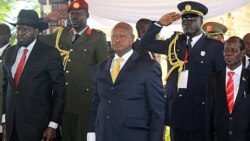The celebrations were muted July 9 as South Sudan celebrated its fourth anniversary of independence. After decades of civil war, the South Sudanese people voted to split from the North and amid high hopes and much jubilation the world’s newest nation was born July 9, 2011.
But the cheer has turned to gloom in many parts of the East African nation as armed conflict continues. The fighting, now approaching its 20th month, has cost thousands of lives and displaced almost 2 million people.
Both government and opposition forces have committed appalling crimes against civilians, including children. President Salva Kiir and Riek Machar and their cronies are personally responsible for ending this conflict and man-made humanitarian crisis. Only leaders on both sides can end this violence. For far too long they have chosen to haggle over personal power and wealth instead of agreeing on solutions. Meanwhile the people of South Sudan continue to suffer.
Almost half of South Sudan’s population is now dependent on international assistance for its very survival. Amid the fighting, the government has failed to protect its citizens and squandered its legitimacy. It has subverted democracy and unilaterally extended its mandate. Both the Government and Opposition have failed to negotiate a resolution.
As the violence drags on, the conflict not only scars the lives of innocent South Sudanese, it threatens to destabilize the wider region. Through all these challenges, the path ahead is clear. Further violence is not the solution. The South Sudanese parties must come to a peace agreement and immediately establish an inclusive transitional government that can serve with legitimacy and represent the needs of the people of South Sudan.
With the hopefulness of July 9, 2011, fresh in mind, now is the time to honor fully the Cessation of Hostilities agreement of January 23 to end the violence, seek a lasting peace, and fulfill the promise of four years ago.

















